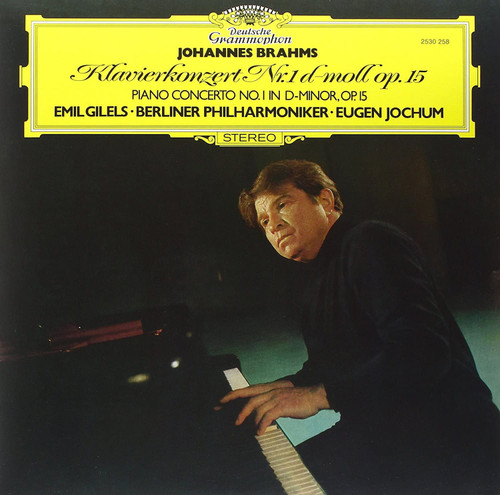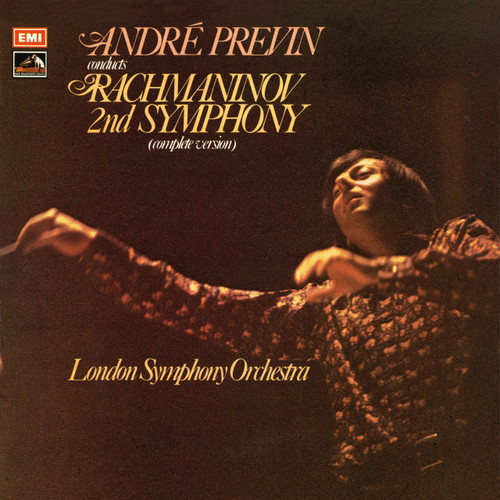The conductor Kurt Sanderling (1912-2011) first met Dmitri Shostakovich during WW2. Colleagues first, the men went on to forge a strong personal friendship that affords a unique insight into both the music and character of this most conflicted composer. Sanderling recorded most of the symphonies with the Berlin Symphony Orchestra, which he led from 1960 to 1977, but it's his dark, deeply moving account of the Fifteenth with the Berlin Philharmonic that I'd want for my desert island. Originally issued on the BP's own label, it's well worth scouring the internet for a used copy of that recording - coupled with a genial performance of Haydn's Symphony No. 82 'The Bear'.
Of course there's plenty of competition in this, Shostakovich's most recorded symphony. Among the most satisfying Fifths I've encountered in recent years are two Euroarts videos: Leonard Bernstein's with the LSO in 1966 and Yutaka Sado's with the Berlin Phil in 2011. Both belong at the more volatile end of the scale, whereas Andris Nelsons' recent Boston recording - part of his ongoing cycle for DG - seems comparatively laid-back. I say 'seems' because behind its public clamor lurks a reading of remarkable intensity and insight that I found quite overwhelming. Indeed, that's probably the most revelatory account of this great symphony that I've ever heard, either on record or in the concert hall.
So, where does Sanderling's BSO Fifth fall in this spectrum? The first movement is certainly measured - perhaps spacious is a better description - but then there's a startling vulnerability here that I wasn't prepared for. Clearly this is not the overt, scruff-grabbing approach that one associates with, say, Bernstein, and some may find this thoughtful, proportionate reading a little too subdued. Those upward-winding string figures certainly aren't as anguished as they can be, but then there's no denying the quiet, compelling authority of this performance.
I was particularly taken with the lovely pastoral quality of this opener, its idylls circled by threatening storm clouds. If you're looking for extra angst and urgency you won't find it here; what you will encounter, though, is a rare transparency - witness that light, perky march tune - and sensibly scaled tuttis. In many ways this is a very musical reading which, like Paavo Jarvi's 'paradigm shifting' Seventh , reveals - and revels in - a lyricism that belies the composer's reputation for crudity and bombast. If that is what Sanderling is trying to highlight here he succeeds admirably.
The playing of this East German band - the fall of the Wall was still seven years away - is warm and plangent; the very refined recording, with plenty of air and detail, adds to the sense of a performance deeply felt and gratefully given. There's point and polish to the Allegretto , not to mention some beguiling string passages that bring to mind Mahler at his most easeful and bucolic. I realize this conductor's unhurried pace won't please everyone, but for others it's a wonderful opportunity to rejoice in the score's inner workings. And no, such instruction is not achieved at the expense of pulse or purpose.
As for the Largoit's both spacious and beautifully spun. Yes, there's a small hiatus at one point - a bad edit, perhaps - but that hardly matters in the presence of such exemplary musicianship. At times there's a Beethoven-like strength / stoicism to the lower strings, which contrasts most strongly with the pliant loveliness of the BSO woodwinds. Here, more than anywhere else in this performance, one senses these are personal utterances, not public proclamations, and that Sanderling brings us much closer to Shostakovich the man than most of his rivals do.
By the time we get to the Allegro non troppoIt's as if we've come to the end of a long and very eventful journey. Sanderling really is a wonderful guide, revealing all the details and nuances that others miss. His finale is brisk and cleanly articulated - such attack in the violins, and what muscular timps - with no hint of the pale gestures or empty rhetoric that so often afflict this problematic finale. Like Nelsons he builds to that great coda without recourse to unnecessary artifice, so that when those mighty bass-drum thwacks arrive the effect is simply overwhelming.
This is not the only recording of Shostakovich's Fifth I'd want to own, but it's certainly one I'd welcome. More than anything else there's an openness to this performance, an honesty if you prefer, that illuminates the score in the most unexpected ways. Factor in a first-class remastering - no steely strings, bloated bass or coarseness in the climaxes - and you have a very special release indeed.
A fresh, unaffected Fifth, shock-full of insight and character; not to be missed.
Dan Morgan
Of course there's plenty of competition in this, Shostakovich's most recorded symphony. Among the most satisfying Fifths I've encountered in recent years are two Euroarts videos: Leonard Bernstein's with the LSO in 1966 and Yutaka Sado's with the Berlin Phil in 2011. Both belong at the more volatile end of the scale, whereas Andris Nelsons' recent Boston recording - part of his ongoing cycle for DG - seems comparatively laid-back. I say 'seems' because behind its public clamor lurks a reading of remarkable intensity and insight that I found quite overwhelming. Indeed, that's probably the most revelatory account of this great symphony that I've ever heard, either on record or in the concert hall.
So, where does Sanderling's BSO Fifth fall in this spectrum? The first movement is certainly measured - perhaps spacious is a better description - but then there's a startling vulnerability here that I wasn't prepared for. Clearly this is not the overt, scruff-grabbing approach that one associates with, say, Bernstein, and some may find this thoughtful, proportionate reading a little too subdued. Those upward-winding string figures certainly aren't as anguished as they can be, but then there's no denying the quiet, compelling authority of this performance.
I was particularly taken with the lovely pastoral quality of this opener, its idylls circled by threatening storm clouds. If you're looking for extra angst and urgency you won't find it here; what you will encounter, though, is a rare transparency - witness that light, perky march tune - and sensibly scaled tuttis. In many ways this is a very musical reading which, like Paavo Jarvi's 'paradigm shifting' Seventh , reveals - and revels in - a lyricism that belies the composer's reputation for crudity and bombast. If that is what Sanderling is trying to highlight here he succeeds admirably.
The playing of this East German band - the fall of the Wall was still seven years away - is warm and plangent; the very refined recording, with plenty of air and detail, adds to the sense of a performance deeply felt and gratefully given. There's point and polish to the Allegretto , not to mention some beguiling string passages that bring to mind Mahler at his most easeful and bucolic. I realize this conductor's unhurried pace won't please everyone, but for others it's a wonderful opportunity to rejoice in the score's inner workings. And no, such instruction is not achieved at the expense of pulse or purpose.
As for the Largoit's both spacious and beautifully spun. Yes, there's a small hiatus at one point - a bad edit, perhaps - but that hardly matters in the presence of such exemplary musicianship. At times there's a Beethoven-like strength / stoicism to the lower strings, which contrasts most strongly with the pliant loveliness of the BSO woodwinds. Here, more than anywhere else in this performance, one senses these are personal utterances, not public proclamations, and that Sanderling brings us much closer to Shostakovich the man than most of his rivals do.
By the time we get to the Allegro non troppoIt's as if we've come to the end of a long and very eventful journey. Sanderling really is a wonderful guide, revealing all the details and nuances that others miss. His finale is brisk and cleanly articulated - such attack in the violins, and what muscular timps - with no hint of the pale gestures or empty rhetoric that so often afflict this problematic finale. Like Nelsons he builds to that great coda without recourse to unnecessary artifice, so that when those mighty bass-drum thwacks arrive the effect is simply overwhelming.
This is not the only recording of Shostakovich's Fifth I'd want to own, but it's certainly one I'd welcome. More than anything else there's an openness to this performance, an honesty if you prefer, that illuminates the score in the most unexpected ways. Factor in a first-class remastering - no steely strings, bloated bass or coarseness in the climaxes - and you have a very special release indeed.
A fresh, unaffected Fifth, shock-full of insight and character; not to be missed.
Dan Morgan
Listen to music samples
01. Moderato. Allegro Non Troppo | 02. Allegretto | 03. Largo |
04. Allegro Non Troppo |
Reel audio tapes carry warranty of 2 years if treated properly. No returns of used product.







